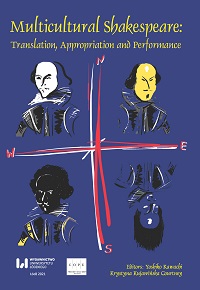Kabbalah, "Dybbuks", and the Religious Posthuman in the Shakespearean Worlds of "Twin Peaks"
DOI:
https://doi.org/10.18778/2083-8530.24.03Keywords:
Twin Peaks, Twin Peaks: The Return, Fire Walk with Me, Twin Peaks: The Missing Pieces, The Secret History of Twin Peaks, Twin Peaks: The Final Dossier, David Lynch, Mark Frost, Kabbalah, religious posthuman, Shakespeare, Pericles, The Tempest, Hamlet, MacbethAbstract
In the series Twin Peaks, Mark Frost, David Lynch and others create a mythological framework structured by and filtered through Shakespeare in a postsecular exploration of the posthuman. Twin Peaks exemplifies a cultural postsecular turn in its treatment of the posthuman, taking the religious and spiritual perspectives to new —and often extreme—heights in its use of Kabbalah and other traditions. Twin Peaks involves spiritual dimensions that tap into other planes of existence in which struggles between benign and destructive entities or forces, multiple universes, and extradimensional, nonhuman spirits question the centrality of the human and radically challenge traditional Western notions of being. Twin Peaks draws from Shakespeare’s expansive imagination to explore these dimensions of reality that include nonhuman entities—demons, angels, and other spirits—existing beyond and outside of fabricated, human-centered worlds, with the dybbuk functioning as the embodiment of the postsecular religious posthuman.
Downloads
References
Clarke, Bruce. –The Nonhuman.‖ The Cambridge Companion to Literature and the Posthuman. Eds. Bruce Clarke and Manuela Rossini. Cambridge: Cambridge University Press, 2017. 141-152.
Google Scholar
DOI: https://doi.org/10.1017/9781316091227.014
Dan, Joseph. –Samael, Lilith, and the Concept of Evil in Early Kabbalah.‖ AJS Review 5 (1980): 17-40 https://doi.org/10.1017/S0364009400000052.
Google Scholar
DOI: https://doi.org/10.1017/S0364009400000052
Diaz, Martha L. –Evil and Vampirism in Twin Peaks: Fire Walk with Me.‖ Approaching Twin Peaks: Critical Essays on the Original Series. Eds. Eric Hoffman and Dominick Grace. Jefferson, North Carolina: McFarland & Company, 2017. 143-153.
Google Scholar
Freedman, Harry. Kabbalah: Secrecy, Scandal and the Soul. London and New York: Bloomsbury Continuum, 2019
Google Scholar
Frost, Mark. The 6 Messiahs. New York: Avon Books, 1995.
Google Scholar
Frost, Mark. The Secret History of Twin Peaks. New York: Flatiron Books, 2016. Kindle edition.
Google Scholar
Frost, Mark. Twin Peaks: The Final Dossier. New York: Flatiron Books, 2017. Kindle edition.
Google Scholar
Frost, Scott. Diane: The Twin Peaks Tapes of Agent Cooper. With Kyle MacLachlan. Mac Simon and Schuster Audio, 1990. Audible Audiobook.
Google Scholar
Graham, Elaine. –The Final Frontier? Religion and Posthumanism in Film and Television.‖ Palgrave Handbook on Posthumanism in Film and Television. Eds. Michael Hauskeller, Thomas D. Philbeck, and Curtis D. Carbonell. Basingstoke and New York: Palgrave Macmillan, 2015. 361-370.
Google Scholar
DOI: https://doi.org/10.1057/9781137430328_36
Hurley, Gavin F. –Beyond Angels, Beyond Demons: Post-Christian Dissociative Rhetoric within Twin Peaks.‖ Approaching Twin Peaks: Critical Essays on the Original Series. Eds. Eric Hoffman and Dominick Grace. Jefferson, North Carolina: McFarland & Company, 2017. 81-100.
Google Scholar
Lynch, David. –Scene by Scene.‖ Interview with Mark Cousins (1999). YouTube. Posted by Linda Faludi, Jul 17, 2020 https://www.youtube.com/watch?v=3GynZIEGoiY Accessed 23 August 2021.
Google Scholar
Lynch, Jennifer. The Secret Diary of Laura Palmer. With Sheryl Lee. Twin Peaks Productions, 1990. Audible audiobook—unabridged.
Google Scholar
Moore, Elise. –The Return, Time, and Shakespearean Romance ‖ Bright Wall / Dark Room. Issue 68: Time. February 2019 https://www.brightwalldarkroom.com/2019/02/22/twin-peaks-the-return-shakespeare/ Accessed 24 August 2021.
Google Scholar
Stamhuis, Lindsay. –Notes from the Bookhouse: Legends of Ancient Sumeria.‖ Twentyfive Years Later. 2017 https://25yearslatersite.com/2017/11/25/notes-from-thebookhouse-legends-of-ancient-sumeria/ Accessed 24 August 2021.
Google Scholar
Twin Peaks: The Entire Mystery and The Missing Pieces. (The Complete Television Series, Twin Peaks: Fire Walk with Me and The Missing Pieces.) Mark Frost and David Lynch. Blu-Ray. CBS Studios, 2016.
Google Scholar
Twin Peaks: A Limited Event Series. (Twin Peaks: The Return.) Blu-Ray. Showtime, 2017.
Google Scholar
Downloads
Published
How to Cite
Issue
Section
License

This work is licensed under a Creative Commons Attribution-NonCommercial-NoDerivatives 4.0 International License.












